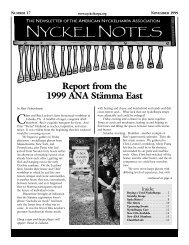About the Nyckelharpa playing at Skansen - American Nyckelharpa ...
About the Nyckelharpa playing at Skansen - American Nyckelharpa ...
About the Nyckelharpa playing at Skansen - American Nyckelharpa ...
You also want an ePaper? Increase the reach of your titles
YUMPU automatically turns print PDFs into web optimized ePapers that Google loves.
SUMMER 2008 N Y C K E L N O T E S 17<br />
Order Form<br />
Prices listed are for ANA members/non-members.<br />
Price includes shipping to a US address.<br />
Playing strings: Qty Price Cost<br />
Prim Full Set $67/$75 $<br />
Prim A (1) $18/$20 $<br />
Prim C (2) $14/$16 $<br />
Prim G (3) $16/$18 $<br />
Prim C (4) $19/$21 $<br />
Resonance strings:<br />
6+6 resonance set $22/$27 $<br />
4+4+4 resonance set $22/$27 $<br />
12-step resonance se $22/$27 $<br />
Name<br />
Street<br />
City<br />
St<strong>at</strong>e Zip<br />
Phone<br />
E-mail<br />
String Bazaar<br />
The ANA is pleased to offer<br />
nyckelharpa strings for sale!<br />
We have <strong>playing</strong> strings and three<br />
versions of understring sets.<br />
Total: $<br />
e-mail for inquiries: strings@nyckelharpa.org<br />
Send this form along with a check payable to<br />
<strong>American</strong> <strong>Nyckelharpa</strong> Associ<strong>at</strong>ion to:<br />
Tim Newcomb<br />
P.O. Box 51, Montpelier, VT 05602<br />
• please note •<br />
Because of <strong>the</strong> excessively weak dollar<br />
our Swedish Prim string prices must<br />
be increased. Tim Newcomb, our string<br />
man, was on <strong>the</strong> road <strong>at</strong> press time<br />
(without access to his string info) and<br />
asked me to please simply request th<strong>at</strong><br />
any potential string buyers contact him<br />
prior to placing any orders. The next<br />
issue of NN will list <strong>the</strong> correct prices.<br />
Prices posted on ANA’s website will be<br />
upd<strong>at</strong>ed as soon as new prices are decided<br />
upon. We apologize for <strong>the</strong> inconvenience.<br />
—Rita Leydon<br />
Playing Strings<br />
The <strong>playing</strong> strings are <strong>the</strong> four largest strings, <strong>the</strong><br />
ones th<strong>at</strong> you actually touch with <strong>the</strong> bow. PRIM brand<br />
strings are made by an old Swedish string manufacturing<br />
company. Their fiddle strings are popular among<br />
folk musicians, and are available widely in <strong>the</strong> US.<br />
Their nyckelharpa strings are basically <strong>the</strong> same as <strong>the</strong>ir<br />
cello strings, except th<strong>at</strong> <strong>the</strong>y are <strong>the</strong> correct length for<br />
nyckelharpas instead of about a foot too long. All four<br />
strings are wound. The A-string is .020” (0.50 mm) in<br />
diameter.<br />
Sympa<strong>the</strong>tic Strings<br />
We offer three versions of understrings, described<br />
more fully in <strong>the</strong> January 1998 edition of Nyckel Notes.<br />
Basically, <strong>the</strong> three sets can be called 6+6, 4+4+4, and<br />
12-step. There’s actually some logic here:<br />
6+6 is<br />
• 6 wound strings .021” (0.53 mm) in diameter<br />
• 6 plain strings .014” (0.36 mm) in diameter<br />
4+4+4 is<br />
• 4 wound strings 0.24” (0.61 mm) in diameter<br />
• 4 wound strings .021” (0.53 mm) in diameter<br />
• 4 plain strings .014” (0.36 mm) in diameter<br />
12-step is<br />
• 12 strings, varying from .025” (0.64 mm) to .014”<br />
(0.36 mm), by steps of .001”. The lower 6 are<br />
wound, <strong>the</strong> higher 6 are plain.

















